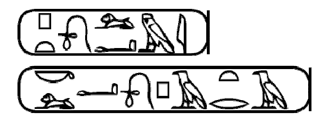Two Ithaca High School students sponsored by Cornell professors place first in U.S. in linguistics Olympiad
By Bill Steele
Two Ithaca High School students, Rachel Zax and Ryan Musa, were the top winners in the inaugural North American Computational Linguistics Olympiad (NAMCLO), March 29, which they entered at the invitation of Cornell professors.
They scored first and second out of 195 students who participated nationwide. Along with two other winners they will be invited to represent the United States to compete at the International Linguistics Olympiad in August in St. Petersburg, Russia.
Are you smarter than a 10th-grader? Try a sample problem.
by Tom Payne, based on research by Jean-François Champollion, the Egyptologist who deciphered the Rosetta Stone
The following are representations of two Egyptian "cartouches" from the Greco-Roman period. A cartouche is an oblong set of hieroglyphic characters that represents a name, a word or a phrase. One of these cartouches represents the name of the Queen "Cleopatra." Your task is to figure out which one means "Cleopatra" and what the other one probably means (Hint: The other cartouche is the name of another Ancient Egyptian ruler).

At the invitation of Cornell, 11 students from Ithaca High School and the Lehman Alternative Community School took part in the competition from a site at Cornell. Others entered at sites set up by Carnegie Mellon University, Brandeis University, the University of Pennsylvania and via the Internet. Zax and Musa and the other two top U.S. winners will attend a practice session in New York City and a weeklong workshop in Estonia before the competition in St. Petersburg.
The Olympiad was organized by faculty at the four universities where competitors gathered, including Cornell's professor Claire Cardie and associate professor Lillian Lee, who are both specialists in natural language processing. They asked Rosalind Teukolsky, who teaches computer science at Ithaca High School, to inform students about the competition.
The goal is to identify talented high school students with an aptitude for linguistics. The problems that are given to the students do not assume any prior training in linguistics and use languages that are likely to be unfamiliar to them. While the international competition focuses on linguistics, NAMCLO also included questions relating to the use of computers in the study of language.
A week before taking the test, the Ithaca High School students attended a one-hour orientation session at Cornell led by Eric Breck, a Cornell Ph.D. candidate in computer science.
"I tried to get them interested and let them know what to expect," Breck said, adding, "The thought processes are much like what you would encounter in solving mathematical problems -- in the sense that math is the study of patterns, not just the study of numbers."
He also noted that about half of the students who turned out for the competition were women, which confirmed previous observations that there are more women in this area of research than in other areas of computer science.
NAMCLO's long-range goals are to increase the size and diversity of the pool of future scientists in linguistics, computational linguistics and human language technologies, such as natural language processing, machine translation, speech recognition and information retrieval. NAMCLO also works with the Linguistic Society of America to encourage the teaching of linguistics at the high school level.
NAMCLO is sponsored by the National Science Foundation, Google, the North American Chapter of the Association for Computational Linguistics and Cambridge University Press. Similar programs have been taking place for over 40 years in Europe; the international competition is in its fifth year.
Solution: The bottom cartouche means "Cleopatra" and the top one means "Ptolemy." Each symbol refers to a sound (or "letter"). Applying this knowledge to the first hieroglyph, we get "p" with a "t" below, then an "o", then "l" then "e" and then two unknown sounds. The hint that this must be the name of another famous character from Ancient Egyptian history suggests the name "Ptolemy."
Media Contact
Get Cornell news delivered right to your inbox.
Subscribe